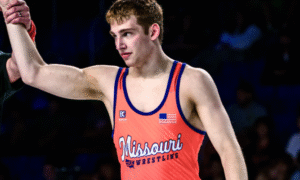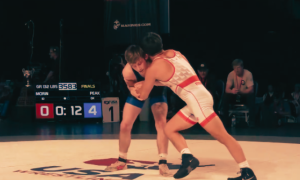In a couple of weeks, I will be embarking on my fourteenth trip to Fargo, North Dakota for the Cadet and Junior Nationals. In eighteen years of teaching and coaching, I have missed three Fargos: 1999 and 2000 while I was coaching in Maryland and not involved in Greco and freestyle; and 2002, when I had to take college classes to earn my Virginia teacher’s certification. 2016 marks thirteen years in a row for me and Fargo; I have learned to love the Fargo Dome and it’s less than stellar Wi-Fi and Sandy Stevens’s urgent announcements to clear the floor before every session. To try and fire Sandy up, I often hop onto mat 1 (the podium mat) and do something silly to see if she is paying attention while she urgently calls for all wrestlers and coaches to clear the floor. So far, Sandy has not noticed me clowning around.
Having been in both the athlete’s and coach’s shoes, I think I can bring a unique perspective on how to maximize your athlete’s potential in Fargo to win the tournament and how you can thrive and survive Fargo as a coach. To win the tournament, your wrestler has to have a good draw and a lot of luck. Viewing all of the wrestling websites beforehand will tell you how many wrestlers are ranked in each weight class, but there will be seven or more studs that are not on the radar. I was a “below the radar” guy when I was a first year Cadet. I was not “in the running” to win the tournament, but after a dicey first match (with John DuPont in my corner, go figure) I pinned everyone in my pool, including the kid who was supposed to walk through the tournament uncontested. Unexpected events will make or break Fargo. I really believe that if a wrestler focuses on a few things while training, they can wreck havoc on the bracket.
First and foremost, training is probably the most important part of the Fargo equation. If you have not trained seriously since your Greco state tournament trouble looms on the horizon! Showing up to training camp out of shape and overweight is not the way to win Fargo — but there are plenty of wrestlers out there who think they can pull it all together in less than a week. Let me know how that goes for you! Hopefully your off-season club is continuing to work out now that school is out. In some states, it is very difficult to find quality clubs to continue training. Perhaps you competed in the Cadet or Junior Duals; this is a good start. Both dual tournaments offer wrestlers the opportunity to get a ton of matches in a short period of time. If you came away from the Duals in relatively decent shape and with perspective, you are on the right track.

(Photo: John Sachs/Tech-Fall.com)
Training must focus on the key elements of successful Greco wrestling: positioning, pummeling, and protecting. One of the reasons I was successful in Greco was because of positioning. By staying in good position, hand-fighting without reaching, and making the center of the mat my home for six minutes, I was able to dictate the pace of most matches.
- From the opening whistle, you must make it your goal to control every aspect of the match, beginning with positioning. Keep a good stance that allows you to move, but not expose openings for your opponent. Hand fight to your preferred tie; it may take a few seconds to get there, so be persistent.
- Solid pummeling skills help reinforce good position. When I pummel, it is for a specific reason. Whether it is to set up a duck under or get to a body lock or a throw, pummel hard! A good pummeler can break matches open thanks to the physical pounding of a good pummel.
- By protecting, I do not mean to become passive when you have a lead. Rather, keep yourself out of danger by not taking big risks. You don’t have to throw everyone from your feet to score points. Be stingy and conservative when needed. Look for an easy takedown, like an arm-drag or snap-down whenever possible.
I think a wrestler must have a very solid attack on their feet and be able to turn or lift everybody — not just the “weak” kids, but the studs, as well. The ability to score on all opponents is huge in Fargo. Find what works on your feet and stick with it; trust your Greco instincts on pummeling and position. He who keeps good position will score! The difference maker is going to be the par terre position. If you cannot score points on top and defend on bottom, the chances of making it to the podium are marginal at best. I learned early on in my Greco career that the ability to turn every opponent was crucial in the big matches. I focused on developing a rib crunching gutwrench and a straight gut lift could blow a tight match open. Once you “five” a wrestler who is not used to getting back arched over the top, windows of opportunity open!
Defense and the ability to shut your opponent down is crucial in the waning moments of a match. Be able to counter whatever your opponent throws, literally or figuratively, at you. Again, position, pummeling, and protection are huge with defense. Unless you are behind in the last thirty seconds, find a control tie to shut your opponent down. For me, the two-on-one was my control tie to close out a match. By keeping in good position with my two-on-one, I can force my opponent into desperation and counter score. Stay in the middle of the mat and hold your ground!
I do not recommend going chest to chest in the last thirty seconds of a match, unless you are behind. Why put yourself at risk for getting tossed when you use a solid control tie to end the match?
These elements need to be active parts of your training. If your practices consist of learning technique, followed by a little drilling, and lots of live wrestling, you may miss out on the strategies needed to win Fargo. You must have “transitional” wrestling as part of each Greco practice. By this I mean you need to chain a takedown right into a turn. Much of what I teach my wrestlers on their feet in Greco leads directly into a gutwrench. Develop your hand-fighting and pummeling skills so you will be able to do both without getting tired throughout the match. Work on par terre offense and defense. Be able to stop the best kid in the room’s gutwrench. Spend time defending all kinds of lifts. Midwestern Greco guys are known for their lifting prowess.
Challenge yourself every day in practice to work on a skill that needs improvement. Hopefully, your coach knows what you need to work on and will give you some drills to do. If not, video your practice sessions and critique what went right and what went wrong. Focus on improvement and success will come!


















